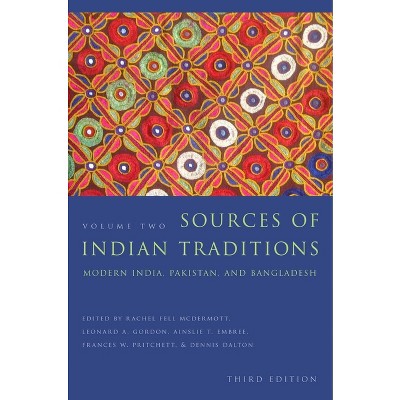Sponsored

Contentious Traditions - by Lata Mani (Paperback)
$33.95
In Stock
Eligible for registries and wish lists
Sponsored
About this item
Highlights
- Contentious Traditions analyzes the debate on sati, or widow burning, in colonial India.
- About the Author: Lata Mani is an Indian feminist and historian who currently lives in California.
- 259 Pages
- History, Asia
Description
About the Book
"An important and disturbing book. Lata Mani has reopened the archives on widow burning in colonial India. Her meticulous reading of contemporary texts . . . is exemplary for its conceptual sophistication. Unsettling and illuminating, this is feminist scholarship at its best."--Ranajit Guha, founding editor "Subaltern Studies""Mani's argument that the terms 'tradition' and 'modernity' are inscribed and reinscribed in the bodies of colonized women has forever changed our understandings of patriarchy, nationalism, and colonialism, and indeed redefined the conditions for 'knowing' with respect to these contexts."--Lisa Lowe, author of "Immigration Acts"
"Lata Mani's brilliant and persuasive analysis of official, native and missionary writings on "sati" in colonial India makes for a new beginning in contemporary analysis of colonial discourse.This is the book that many have waited for. A landmark publication in several fields at once: modern South Asian history, feminist critiques of colonial discourse, and cultural studies."--Dipesh Chakrabarty, University of Chicago
Book Synopsis
Contentious Traditions analyzes the debate on sati, or widow burning, in colonial India. Though the prohibition of widow burning in 1829 was heralded as a key step forward for women's emancipation in modern India, Lata Mani argues that the women who were burned were marginal to the debate and that the controversy was over definitions of Hindu tradition, the place of ritual in religious worship, the civilizing missions of colonialism and evangelism, and the proper role of the colonial state. Mani radically revises colonialist as well as nationalist historiography on the social reform of women's status in the colonial period and clarifies the complex and contradictory character of missionary writings on India.The history of widow burning is one of paradox. While the chief players in the debate argued over the religious basis of sati and the fine points of scriptural interpretation, the testimonials of women at the funeral pyres consistently addressed the material hardships and societal expectations attached to widowhood. And although historiography has traditionally emphasized the colonial horror of sati, a fascinated ambivalence toward the practice suffused official discussions. The debate normalized the violence of sati and supported the misconception that it was a voluntary act of wifely devotion.
Mani brilliantly illustrates how situated feminism and discourse analysis compel a rewriting of history, thus destabilizing the ways we are accustomed to look at women and men, at "tradition," custom, and modernity.
From the Back Cover
"An important and disturbing book. Lata Mani has reopened the archives on widow burning in colonial India. Her meticulous reading of contemporary texts . . . is exemplary for its conceptual sophistication. Unsettling and illuminating, this is feminist scholarship at its best."--Ranajit Guha, founding editor Subaltern Studies"Mani's argument that the terms 'tradition' and 'modernity' are inscribed and reinscribed in the bodies of colonized women has forever changed our understandings of patriarchy, nationalism, and colonialism, and indeed redefined the conditions for 'knowing' with respect to these contexts."--Lisa Lowe, author of Immigration Acts
"Lata Mani's brilliant and persuasive analysis of official, native and missionary writings on sati in colonial India makes for a new beginning in contemporary analysis of colonial discourse.This is the book that many have waited for. A landmark publication in several fields at once: modern South Asian history, feminist critiques of colonial discourse, and cultural studies."--Dipesh Chakrabarty, University of Chicago
Review Quotes
"Examines the documents of the colonial bureaucracy, the writings of the nineteenth-century indigenous male elite, the journals and publications of missionaries, and numerous European eyewitness accounts. She asks why the British first loudly denounced it, then covertly sanctioned it, and then officially banned it. . . . Contentious Traditions shows how divided the colonial bureaucrats were on the political costs of intervening in sati, how the grounds shifted in the arguments that the nineteenth-century Bengali reformer Rammonhun Roy made against sati in response to colonial pronouncements. how the Baptist missionaries took very different stances in addressing British and Indian audiences, and burning ricocheted between horror and fascination. . . . In citing the gruesome evidence that many satis were neither "voluntary" nor painless, and by assuming that the material causes for many satis make them by definition non-religious, Lata Mani discounts the religious ideology that might have motivated either the woman herself or the people forcing her to do it, or both."--Times Literary Supplement
About the Author
Lata Mani is an Indian feminist and historian who currently lives in California.Dimensions (Overall): 9.12 Inches (H) x 6.11 Inches (W) x .81 Inches (D)
Weight: .92 Pounds
Suggested Age: 22 Years and Up
Number of Pages: 259
Genre: History
Sub-Genre: Asia
Publisher: University of California Press
Theme: India & South Asia
Format: Paperback
Author: Lata Mani
Language: English
Street Date: December 30, 1998
TCIN: 1005546280
UPC: 9780520214071
Item Number (DPCI): 247-09-1204
Origin: Made in the USA or Imported
If the item details aren’t accurate or complete, we want to know about it.
Shipping details
Estimated ship dimensions: 0.81 inches length x 6.11 inches width x 9.12 inches height
Estimated ship weight: 0.92 pounds
We regret that this item cannot be shipped to PO Boxes.
This item cannot be shipped to the following locations: American Samoa (see also separate entry under AS), Guam (see also separate entry under GU), Northern Mariana Islands, Puerto Rico (see also separate entry under PR), United States Minor Outlying Islands, Virgin Islands, U.S., APO/FPO
Return details
This item can be returned to any Target store or Target.com.
This item must be returned within 90 days of the date it was purchased in store, shipped, delivered by a Shipt shopper, or made ready for pickup.
See the return policy for complete information.
Frequently bought together

$8.99
Buy 2, get 1 free select books, music & movies
5 out of 5 stars with 1 ratings
Trending Non-Fiction

$15.68
Buy 2, get 1 free select books, music & movies
4.7 out of 5 stars with 192 ratings

$19.31
was $20.98 New lower price
Buy 2, get 1 free select books, music & movies
4 out of 5 stars with 60 ratings

$19.58
MSRP $29.00
Buy 2, get 1 free select books, music & movies
4.6 out of 5 stars with 13 ratings

$4.59
MSRP $7.99
Buy 2, get 1 free select books, music & movies
4.8 out of 5 stars with 121 ratings

$6.20
MSRP $10.95
Buy 2, get 1 free select books, music & movies
4.8 out of 5 stars with 33 ratings

$7.09
MSRP $9.99
Buy 2, get 1 free select books, music & movies
4.9 out of 5 stars with 46 ratings










